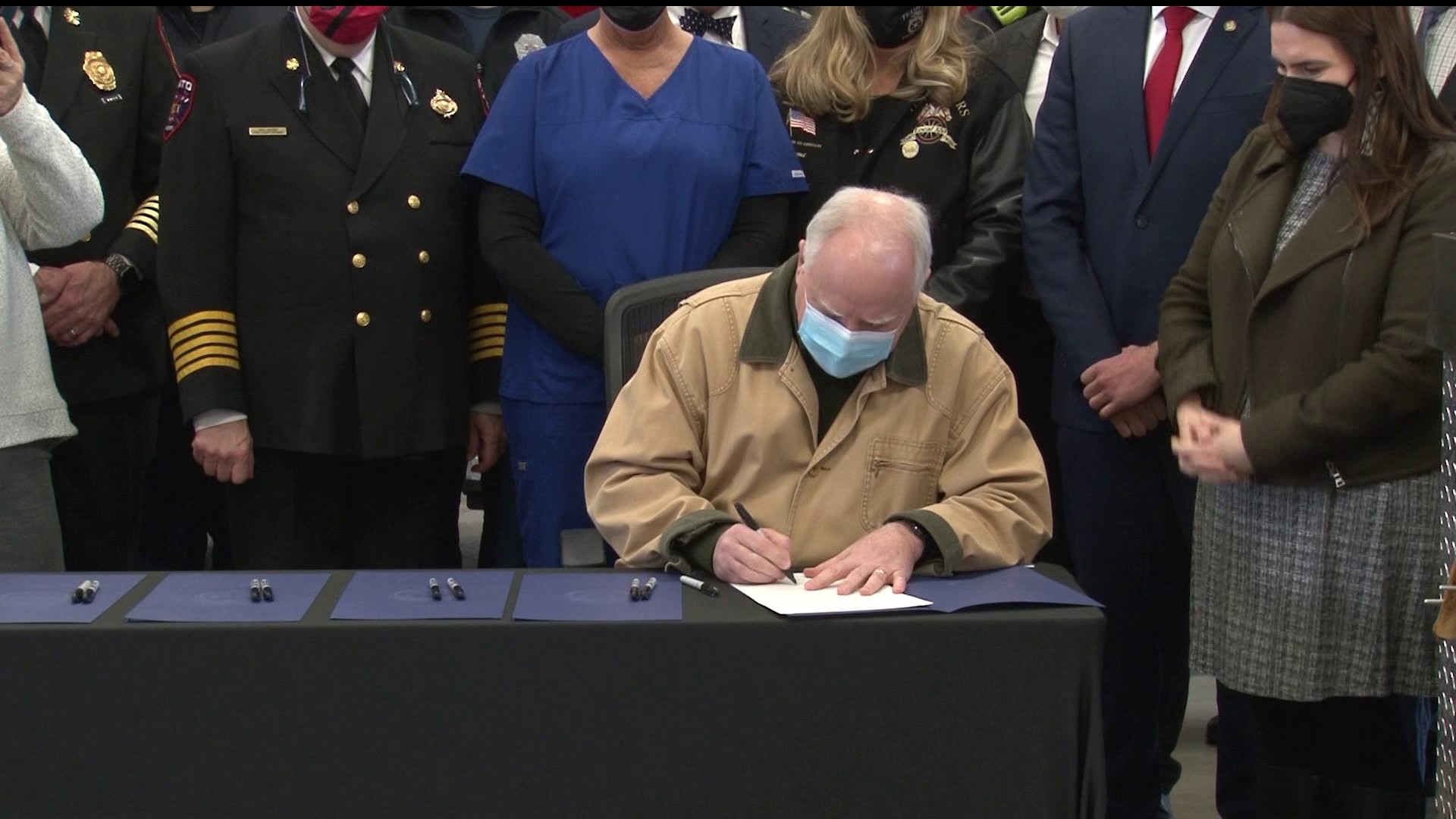BROOKLYN PARK, Minn. — Frontline workers will once again have a faster path to Workers Compensation benefits in Minnesota, a presumption in law that a COVID-19 infection happened in the workplace and is a job-related injury.
First responders and healthcare workers joined lawmakers at Brooklyn Park's central fire station Friday afternoon, to watch Gov. Tim Walz sign the bill extending that rule until May of 2023. It was the first bill passed by the legislature in the 2022 Session and had strong bipartisan support.
"Those people were there. There was no break in there. They responded accordingly," Gov. Walz remarked before signing the bill.
"They did all they could at the time, that we knew, but it put people at risk. And the risk continues for them."
The workplace presumption is critical to helping first responders get coverage for medical costs and be paid for lost time during their recovery and quarantine.
It applies 183,000 frontline workers in the following categories:
- Firefighters
- Law enforcements officers
- Paramedics
- EMTs
- Health care providers, nurses or assistive employees in a health care, home care or long-term care setting who work with COVID-19 patients
- Nurses, health care workers, correctional officers or security counselors at correctional facilities
- Child care providers who are required to provide child care for the children of first responders and health care workers under the Governor’s Executive Orders
Rep. Dan Wolgomott, a St. Cloud Democrat and Sen. Jeff Howe, a Rockville Republican, spearheaded the effort to get quick passage in the state's divided legislature. The task had added urgency because the previous Workers Comp presumption for frontline workers expired Dec. 31.
"The way this works is pretty simple. If you fall into one of those categories and you test positive for COVID-19, it presumes you got it on the job and you're covered under Workers Compensation."
Rep. Wolgamott said since the original bill became law in April of 2020, at least 22,000 first responders have used Workers Comp benefits, with the average payment for lost work time being $1,000 and the average for medical bills at $9,600.
Lawmakers say they're hoping to pass another bill to help those who got sick during that gap, between Jan. 1 and Feb. 10. At least two firefighters died of COVID-related illnesses in Minnesota during that gap period.
Scott Vadnais of the Edina Fire Department, who is the president of the Minnesota Professional Firefighters Association, thanked lawmakers and the governor for their swift action.
"Each day we work we're faced with situations that do not have a playbook. We needed help. You responded. This law was our 9-1-1 call for help."
Brian Peters of the Minnesota Police and Peace Officers Association said the legislature's actions were in sharp contrast to the slow pace that defines most legislative bodies.
"This moved at lightning speed because of the work of Rep. Wolgamott and Sen. Howe. It was amazing!"
House Speaker Melissa Hortman thanked the first responders for going to bat for the bill and putting it on the front burner at the State Capitol.
"This legislation happened because of the advocacy of the first responders, going to the Capitol and saying what they needed, and pushing until the got it done."
Before Gov. Walz left the firehouse, leaders of the Minnesota Fire Chiefs Association presented him with a commemorative firefighter axe with and engraved plate thanking him for his support for first responders.
While that was definitely a feel-good event in Brooklyn Park, there's still a battle underway at the Capitol over which workers should be included in the frontline worker bonus checks and how big those checks should be.
The Legislature agreed last year to set aside $250 million for essential worker bonuses, but there's still a partisan divide over who should be included in the program.
Republicans want those bonus checks only for first responders, corrections officers and healthcare workers who took care of COVID patients.
Democrats, on the other hand, want a larger pool that includes other workers who were exposed to COVID at work, including fields such as grocery clerks, janitors, meat processing workers, school paraprofessionals and childcare providers.
A House Committee Friday passed a Rep. Cedrick Frazier's bill that would increase the bonus program total to $1 billion, making it more feasible to give $1,500 checks to a larger group of workers.
Rep. Joe McDonald, a Delano Republican, spoke against the idea.
"We appreciate the work that they've done. We don't need to give them an extra $1500 so they think that we appreciate them. They know we appreciate them."
Rep. Frazier pointed to people who had testified in support of the bill earlier in the same meeting.
"Earlier today in this hearing we've heard workers testify to the fact they've lost money. They had to take days off of work because they were quarantined, because they were sick."

